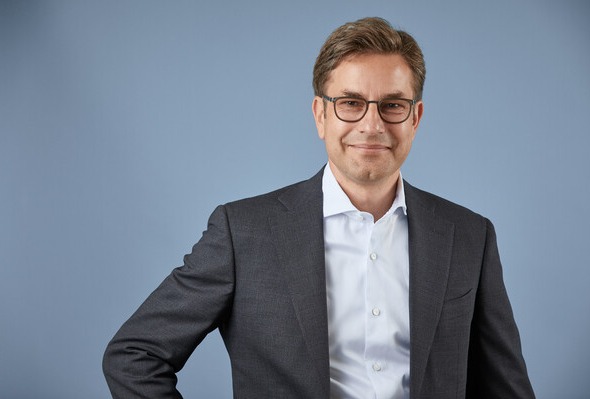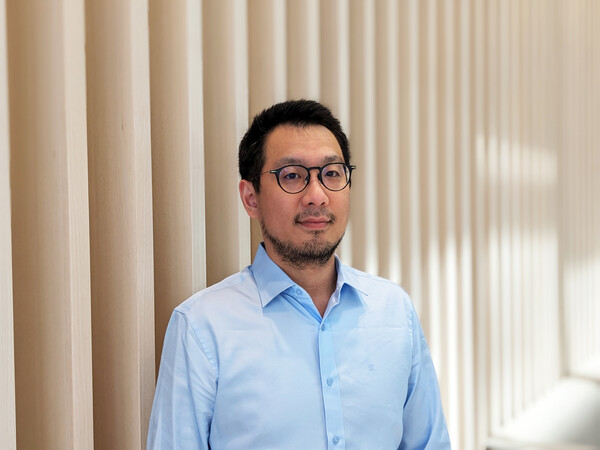Domestic pharmaceutical companies have been noticeably jumping into the CDMO business, particularly in the drug substance (DS) and drug product (DP) areas. However, Vetter still sees a need to bridge the gap between clients' DS and DP manufacturing to meet international requirements in the EU and U.S. markets with their fill-and-finish services.

Despite the challenges brought on by the Covid-19 pandemic, Vetter has managed to mitigate the impact of these headwinds and now continues having its eye on fulfilling its Vetter NExT 2029 strategy.
“Our strategy focuses on pioneering sustainable solutions in the highly regulated biopharmaceutical industry,” said Carsten Press, SVP of Global Sales Organization & Supply Chain Management at Vetter. “These sustainable activities help drive continuous improvement and represent an integral part of the company’s corporate strategy.”
Korea Biomedical Review interviewed Press together with Michael Yi, Business Development Manager at Vetter, on June 20 to discuss the company’s rebranding, strategic approach, and plans to target the Asian region in line with its Vetter NExT 2029 strategy.
Biologics comprise 80% of Vetter’s aseptic fill-and-finish services
Carsten Press has over 25+ years of experience in product and supply chain management for multiple industry-leading enterprises. Since joining Vetter in 2009, he has taken on roles with increasing responsibility. Today, he continues to serve as a Senior Vice President of the Global Sales Organization and Supply Chain, and several other key operational functions.
Yi plays a key role in managing the operation of the Songdo, Korean office focusing on business development and account management for accounts in Korea and Taiwan.

"Vetter’s Korean office plays a significant role in expanding the company’s presence in the rapidly growing domestic biopharmaceutical market,” said Yi.
Vetter’s services revolve around its fill-and-finish capability which refers to the process of filling vials, syringes and cartridges with biological or pharmaceutical DS and finishing the process of packaging the medicine for distribution.
Specifically, Press highlighted Vetter's expertise in fill-and-finish services for complex biologics, such as enzymes, peptides, proteins, and antibodies, which comprises 80 percent of the business.
“We specialize in siliconization and lyophilization of drug-delivery systems which are core technologies of aseptic filling,” Press said. “We also do assembling, packaging, and providing regulatory support for clients to enter the EU and U.S. markets, in addition to pharmaceutical analytical services to prepare products for clinical trials.”
Presently, there are over 200 ongoing projects at Vetter in different development stages ranging from preclinical to phase three.
Vetter also assists clients with the life cycle management of existing products and is one of the preferred launch partners.
Boasting 50 successful commercial products in the last five years, Vetter averages roughly 10 new product launches per year working with blockbusters from big pharmaceuticals and other medicines from smaller biotech companies.
“We are currently in the middle of executing a 1.5 billion euro investment plan over 10 years to replace filling lines and resources in the existing buildings,” said Press. “Some of those funds will also be directed towards constructing new buildings and inserting new production lines and equipment in these buildings.”
Plant digitalization driving company success
But fulfilling this stage requires a focus on digitalization and automation at the plants, insists Press.
In this regard, Vetter’s clean room technology (V-CRT), combines RABS and isolator technologies for flexibility during changeovers.
“It enables us to run production lines at the right levels of overall equipment effectiveness (OEE) to achieve the necessary uptime to effectively manage the high number of customers, products, and changeovers per clean room,” he pointed out.
Outside of its clean room technologies, it also boosts its efficiency through digitalization in procurement, production, and warehouse operations.
Specifically, a digital procurement suite is responsible for reducing the manual procurement tasks, while the HelMo system is used in production for defrosting the DS. A YuMi robot system is also used to assist with secondary packaging and warehouse duties such as sorting syringes.
“Our latest warehouse in Germany is fully automated so no operator is required to run the forklift in the high-bay storage,” Press shared. “AI will also play a more vital role in the supply chain process going forward and we want to increase its use to maintain our quality and reliability.”
Despite these successes, Press admitted that it is not always smooth sailing. For example, the Covid-19 pandemic complicated supply chain management, but Vetter successfully navigated to deliver uninterrupted supply to patients.
On this note, he also mentioned the growing expectations from EU and U.S. regulatory authorities due to the recent update of the global manufacturing standards, e.g. Annex 1 requirements.
This document adds to the existing rules creating stricter regulations to comply with manufacturing standards but reassured that Vetter was up to the challenge.
Pioneering sustainability through the Vetter NExT 2029 strategy
Additionally, through annually issued sustainability reports, the company can report on its achievements and exhibit transparency through its scope 3 emissions and CO2 balance which is one of the biggest requirements to manage the impacts of global warming.
“Our operation aligns with requirements of the International Greenhouse Gas Protocol and we managed to significantly reduce our electricity consumption and CO2 emissions,” said Press. “Last year, we achieved 100 percent green electricity and are also using photovoltaic sources at our buildings to keep our energy emissions clean.”
Adding to this, Yi mentioned that the sustainability report lends itself to greater transparency, giving its clients confidence in implementing their own sustainability goals.
Recently, Vetter also joined the United Nations Global Compact as one of over 300 biopharmaceutical companies in the world to sign the pledge.
“The membership drives the expansion of ecological and socially responsible supply chains and sustainable business processes in the pharma industries which also helps us to further expand our initiatives internationally,” reassured Yi.
Beyond this, the company is demonstrating its commitment to future sustainability as it also plans to join the science-based target initiative (SBTI) in the fourth quarter of this year, elaborated Yi.
This provides a clearly defined pathway to reduce greenhouse gas emissions and help prevent climate change impacts in line to meet the goals of the Paris Agreement, he went on to say.
Rebranding and BIOPLUS-INTERPHEX
The enhancement of the company branding intends to portray a modern representation of the company and was relaunched earlier this month.
“The brand now clearly states what we stand for and identifies our partnership approach and our sustainability practices,” said Press. “At Vetter, we are a state-of-the-art sustainable company committed to being reliable in all that we do and expressing our key values in this brand relaunch. Our brand values, being responsible, progressive, and responsive, reflects what we do, where we are, and how we think.”
This rebranding comes just in time for the BIOPLUS-INTERPHEX KOREA conference carded for July 12-14 at COEX, southern Seoul.

